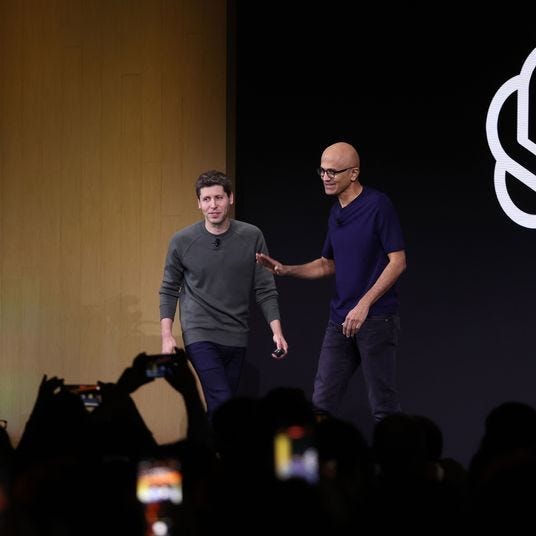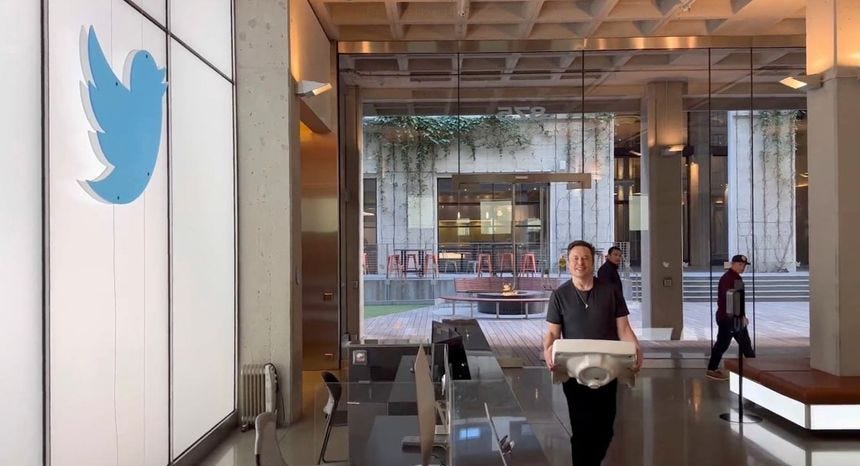Stop Stopping: The decel crisis at OpenAI is everywhere
Weak tech leadership turns every company into a Dilbert comic with enough time
Welcome, Avatar!
First off, a special thank you to the readers who pay to make this newsletter possible.
Your kind words, success stories, and support go a long way.
– Fullstack
Happy Thanksgiving!
There’s much to be thankful for this year, especially the chance to share my thoughts with you the past seven months. I hope you all enjoy your day however you choose to celebrate.
Readers continue to write in thankful for how their new job offers or promotions have changed their life and helped their family. Some have turned their $0.35/day subscription into $10k or $100k+ in income, huge ROI.
For Black Friday until Monday there will be an offer for any reader who would like to try a paid subscription. Click the button below to upgrade.
For those who are now into the wifi-money building stage, KtSaaS, the SaaS boilerplate codebase I’ve been building is ready!
At the bottom of this post, I’ll be giving paid subscribers a special discount code so they can get started building their next SaaS faster, at scale, all in Kotlin.
I have much more to share on KtSaaS, especially as the first builders start to onboard.
Want to learn more? Find everything including docs and demo at ktsaas.io
“Big companies steadily increase their Dilbert score over time like entropy.” – Elon Musk
Another SEV today. That’s 100 this month.
The CTO decides to take the reigns. His DMs have been filled with concerned colleagues (see: the CEO) pointing out his lack of leadership which must be causing the current round of outages.
Leadership. What is leadership?
The CTO announces a temporary, emergency code freeze.
“I’m calling for a total and complete shutdown of new code entering the repo (and no deploys), until our technical teams can figure out what the hell is going on!”
No exit or completion conditions. All microservices. All teams. No merging into repos. No deploys.
Decisive action, much CTO, such wow.
The CTO sits back. Slack message sent. They rest assured. Yes, slowing down temporarily will fix this.
So they stop deploys. They stop PR merges. Soon there’s a new checklist. Another signoff. Are you sure?
In under a week there’s another SEV? Well, there must be a problem with the sign-off form! Let’s build it into a full dashboard.
In a short period of time, a previously high velocity culture can be decimated to match the productivity level of the DMV, but with a fully stocked mini-kitchen.
It’s all a way to add sand in the gears of the development lifecycle. Grain by grain it seems like nothing, small, no impact, until the entire machine grinds to a halt under the friction.
Every New Regime Needs An Emergency
If the past years have taught anything, it is that there is nothing more permanent than emergency measures.
In the frantic flurry, few will fight the new regime brought in by emergency measures. Especially since it’s only temporary. Trust us.
While the current freak outages from the cloud provider will eventually drift away in the rear view mirror, the new growing crisis of engineer dissatisfaction, attrition, and development velocity will loom larger and larger.
The current class of tech leadership thinks themselves better than the IBM or Blackberry suits of the past which drove those companies in the ground.
But just because they have slides, colorful offices, and nap pods for their workplace affairs, doesn’t mean they are any less ignorant, tactless, cowardly, and fit for scoffing than the leaders of IBM or Microsoft.
The decel EA failed coup at OpenAI over the past week was an extremely public example of the type of ignorant, sand in the gears management class whose only tactic is yelling “Stop”!
As the title suggests, I argue we should stop stopping.
The OpenAI Saga
All involved can at least be thankful that the drama has reached a resolution before Thanksgiving, at least as of writing on 2023-11-23.
For those who blinked and missed it, OpenAI, the organization behind ChatGPT and other AI breakthroughs, had a management coup last weekend.
While the precise timeline and citations will eventually be found in a Michael Lewis book and a corresponding Netflix movie, you can get caught up below.
Friday Nov 17
OpenAI fires co-founder & CEO Sam Altman with vague charges in a press release. Co-founder Greg Brockman resigns in protest.
Saturday Nov 18
Some OpenAI board members make their tweets private
Twitter is pulsing with leaks from the OpenAI board and Sam Altman factions, EA (effective altruism – the philosophy held by disgraced FTX founder Sam Bankman Fried) and e/acc (effective accelerationism – counter movement to EA) meme war heats up
Sunday Nov 19
Satya Nadella, CEO of Microsoft, announces they plan to hire Sam and Greg to run a “startup” like advanced AI division within Microsoft. Microsoft’s broad existing deal with OpenAI likely means Sam and Greg can rebuild the company using the existing models and code.
OpenAI board member Ilya Sutskever tweets regret for his part in the coup.
710 of 770 OpenAI employees, including Ilya, sign a letter demanding the return of Sam as CEO and full board resignation or they will quit.

Monday Nov 20
Open AI board hires Emmet Shear, co-founder of Twitch, as new interim CEO. Tweets are dug up of him leaning EA and for slower, safer AI development.
Tuesday Nov 21
Rumors emerge that the OpenAI board is in talks with Anthropic, a rival AI company led and invested in by EA followers, for a firesale acquisition given the dire outcome if employees mass resign.
Weds Nov 22
Open AI board hires back Sam as CEO, most of the old board resigns, and a new board is announced including Bret Taylor (formerly Twitter board), Larry Summers (former Harvard President, Secretary of the Treasury), and Adam D’Angelo (Quora, previous OpenAI board member).
How could this sort of chaos happen at such a dominant company?
This wasn’t some tiny 10 person startup. OpenAI was worth $80b and had close to 800 employees.
Unconventional corporate structure played a part.
OpenAI wasn’t a traditional corporation with shareholders. Instead it was a corporation building ChatGPT that had ownership and control resting in a separate not-for-profit entity’s board of directors.
The contentious board decision to fire CEO Sam Altman were made by the not-for-profit, by board members who publicly endorsed a much slower, safer approach to AI development, if not explicitly members of the EA ideology/cult.
In one recent academic paper a board member even said it would be “consistent with the mission” for the not-for-profit’s mandate to destroy OpenAI the company if that would be the safest for humanity. And then months later, they pushed or led failed coup to achieve to that exact fate.
This is not how serious company board members operate.
And yet, this level of delusions of grandeur, detachment from reality, ignorance, and incompetence is rampant throughout the leadership class in tech, government, and many industries.
Decel incompetence is not an exclusively AI phenomenon.
We Can’t Go Back to How Things Were
Tech leadership at its best is still coding every day.
On average it is composed of washed up engineers who haven’t opened VIM in a decade.
At its worst, tech leadership is composed of product or MBA types without the slightest understanding of how an engineering team or the development lifecycle work (see appendix below), let alone how to write a for loop.
The worst tech leadership will declare in an “emergency” that “we can’t go back to how things were”, like they’re regurgitating WEF slogans. Yes boss, we’re going to “build back better”. Thank you for that guidance.
That fast velocity culture of yesteryear, well I mean 3 weeks ago, yeah that one? Nope, can’t go back to how that worked, given it worked well enough to build this business the past decade.
“No, we need a new, better way of doing engineering. That is safer.”
What evidence or track record do I have that it will succeed or be safer?
“Please, I hear your feedback but you must treat us like we are acting in good faith. I got too much negative feedback yesterday and that behavior must stop.”
And in most tech companies, we’re not building x-ray machines or rockets. This is social media or ecommerce or fintech. Nobody is going to die from an extra minute of downtime.
And yet, this is the leadership class you’ll find at most big tech companies, so utterly incompetent that they will shut down all of engineering for months to avoid looking bad to their boss.
Anyone who has written code in the past 5 years is left squinting wondering whether management is lying to them or is actually this stupid.
In my experience, it’s a combination of both.
The Myth of Progress and the New
The tech leadership you get in any big tech company in North America is fundamentally leftist NPC.
They watch TV. They don’t know history. They send their kids to nicer private schools but still, the entire family is hooked on social media and is nihilist and aimless.
So, forgive them for they know not what they do.
They, like most modern NPCs, fall easily and truly believe the myth of progress. New must be better. The old must be bad.
Which is fine generally if they were making a decision whether to upgrade a software version.
But this mindset is a sharpened bear trap if they attempt to tweak a complex running human system, like an engineering organization, just to do something new.
Like the failures of central planners in communist countries leading to the famine and death of millions of people, trying to centrally plan your team of thousands of engineers is a recipe for disaster.
But try telling this to tech leadership. They will kindly show you to the door and find someone who will carry out their ill-conceived commands.
Their friend from the hot yoga class at Google does this. Their wife’s new boyfriend at Netflix uses this management technique.
The leadership class focuses all effort on de-risking their personal outcome, by copying the practices of the clique around them, who are in similar positions across the industry and status class.
I don’t work currently at Google but the complaints surfaced will resonate to anyone working in big tech. The leadership failures, declining morale, and slow exodus of top talent continues across the industry.
Stop Stopping
Stopping your development process to prevent outages is like telling a baker to stop baking cookies to avoid ever burning a batch.
The failure isn’t coming from your frequent deploys or code merges. Stopping velocity is a blunt tool fraught with risk that rarely is necessary to solve the real problems.
The growing failures of the decel, risk-averse, incompetent leadership class, whether at OpenAI, the government, or your W2, will continue. I’m not naive.
The only question is what you will do about it.
As the Twitter acquisition exemplifies, detailed in the new Walter Isaacson biography on Elon Musk, problems of leadership can often only be solved by new leadership.
The urgency and high velocity that Musk pushes across all his companies is severely lacking in most organizations. It was lacking at Twitter. But, with new leadership, velocity has returned.
My W2 is well overdue for the Elon treatment. Yours might be too.
In the meantime, I’ll cash my paychecks, work on W2 projects that interest me, but focus my energy on wifi-money, where I have ultimate control over velocity and can accelerate as fast as I want.
I suggest you do the same.





